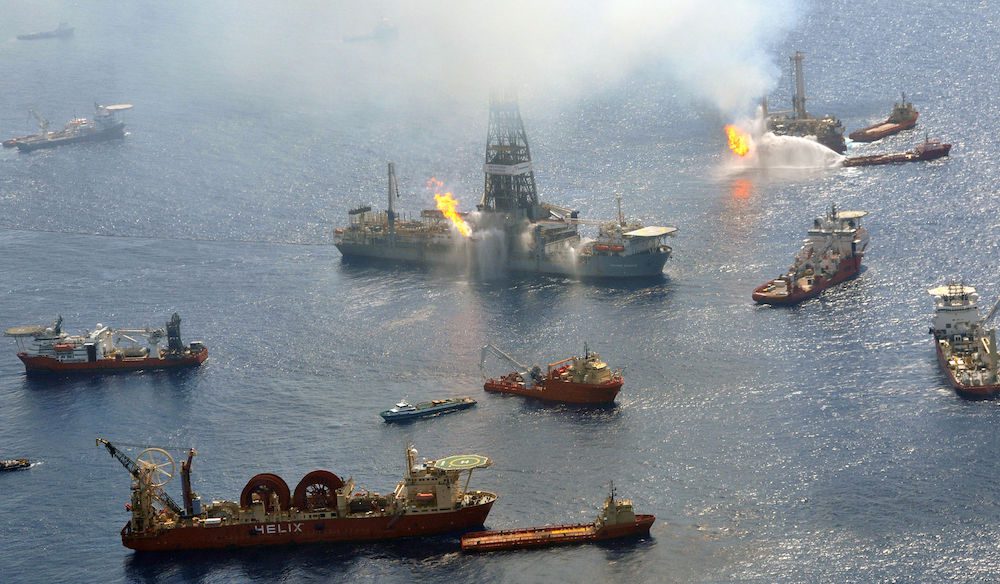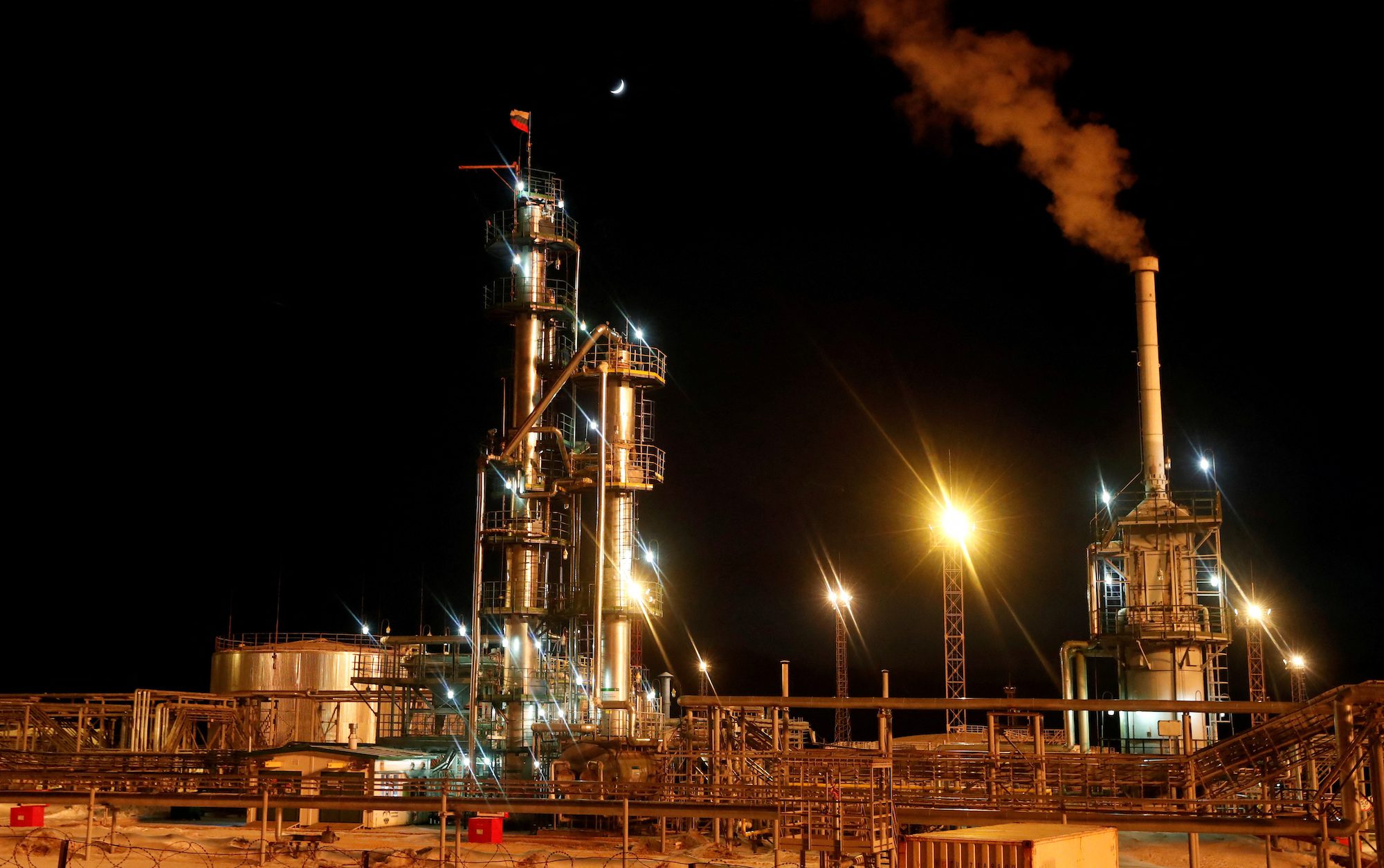The Discoverer Enterprise and the Q4000 work to plug the Macondo well in the Gulf of Mexico, June 26, 2010. Photo credit: U.S. Coast Guard
By Margaret Cronin Fisk
(Bloomberg) — Federal prosecutors have one last chance to send someone to jail over the deadly 2010 BP Plc Gulf of Mexico well blowout and the worst offshore oil spill in U.S. history.
Robert Kaluza, the former BP manager going to trial in New Orleans federal court, faces as long as a year in prison plus fines if he’s convicted. Whether prosecutors will have better luck against Kaluza than with others who fended off charges connected to the spill will be up to a jury of six men and six women listening to opening statements Wednesday.
Kaluza, having already beaten more serious charges, faces a lone misdemeanor count of violating the U.S. Clean Water Act. A co-defendant charged with the same crime pleaded guilty and reached a deal with the U.S. that calls for a sentence of 10 months’ probation, 100 hours of community service and $50,000 in restitution for fouling the water in the gulf.
BP pleaded guilty and agreed in 2012 to pay $4 billion for multiple counts including 11 for manslaughter. But only four BP employees, including Kaluza, were prosecuted. No one in BP’s onshore chain of command over the well was charged and no individual has gone to jail. The only conviction at trial, over mishandling evidence after the spill, was overturned, with the defendant later pleading guilty to a minor charge. The highest- ranking BP executive charged, accused of downplaying spill-size estimates, was acquitted.
Dead Workers
Kaluza meanwhile will benefit from pretrial rulings by U.S. District Judge Stanwood Duval Jr., who’s overseeing the trial. Duval this month barred the U.S. from talking about the 11 drilling rig crew members who died in the April 2010 blast, calling the deaths irrelevant to the alleged pollution violation. Duval said he’d tell the jury about four of the dead workers, but only to let them know why those individuals weren’t testifying in the trial.
Duval said the trial would last three weeks.
The blowout of BP’s Macondo well and the sinking of the Deepwater Horizon drilling rig, and the crude that gushed from the uncapped well on the sea floor for almost three months, have burdened the London-based company with private lawsuits and government fines. BP has set aside $55.5 billion to pay spill- related costs and settlements, according to its Feb. 2 earnings statement.
Civil Penalties
BP last year agreed to pay $20.8 billion to resolve state, local and federal pollution civil penalties and damage claims. The company previously settled economic harm claims with most private-party plaintiffs. BP now estimates that settlement at $12.4 billion, while saying the ultimate price tag “will likely be significantly higher” because many claims haven’t been processed.
Kaluza, 65, was indicted in 2012 along with Donald Vidrine, another BP manager, and charged with ignoring multiple indications that the Macondo well wasn’t secure and with failing to maintain control of the well. Both initially faced 11 counts of seaman’s manslaughter and 11 counts of involuntary manslaughter, as well as the pollution count.
The seaman’s manslaughter charges against both were thrown out because the dead workers weren’t seamen and the U.S. dropped the involuntary-manslaughter claims in December. Vidrine, who pleaded guilty to the final count that month, may testify at Kaluza’s trial. Vidrine is scheduled to be sentenced in April.
Pressure Test
Prosecutors contend the well blew out because Kaluza and Vidrine negligently misinterpreted a critical negative pressure test on the well, concluding it had been safely sealed from leaks when oil and gas were actually beginning to seep into the well from the underground reservoir.
Before the blast, Vidrine ordered the Deepwater Horizon crew to begin replacing heavy drilling mud that was holding back hydrocarbons in the well with lighter seawater, according to a filing accompanying his guilty plea. That let the leaking oil and gas shoot up the pipe and explode on the rig floor.
Kaluza’s lawyers have said in court filings that their client wasn’t responsible or negligent. Kaluza was the day-shift supervisor and had left hours before critical decisions were made, his lawyers said. He had just joined the crew as a fill-in and wasn’t aware of problems with the well, they said.
Both men were responsible for misinterpreting the negative pressure test results, and Vidrine’s order to replace the drilling mud was made with Kaluza’s knowledge and consent, the U.S. said in court papers.
“The government need not prove that the defendant’s conduct was the sole cause of the discharge or even the greatest cause, as long as the conduct was a substantial factor in causing the harm,” prosecutors said in court papers last week. “It is no defense that the conduct of others contributed to the injury.”
The case is U.S. v. Kaluza, 12-cr-00265, U.S. District Court, Eastern District of Louisiana (New Orleans).
–With assistance from Della Hasselle and Laurel Calkins.
©2016 Bloomberg News

 Join The Club
Join The Club











